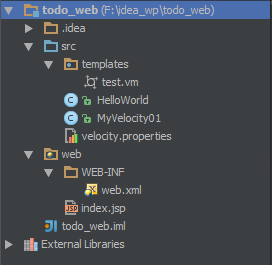velocity使用1.7版本。 在win7下使用intelliJ IDEA建立一基於tomcat的web app項目,命名為todo_web,設置path為/todo,導入velocity相關jar包。只導入velocity-1.7.jar這個包可能會報錯,根據提示再導入velocity自帶的其他包。 項目結構如下:

測試Tomcat
index.jsp內容如下:
復制代碼 代碼如下:
<%-- Created by IntelliJ IDEA. --%>
<%@ page contentType="text/html;charset=UTF-8" language="java" %>
<html>
<head>
<title></title>
</head>
<body>
<%
out.print("hi,todo");
%>
</body>
</html>
HelloWorld.java內容如下:
復制代碼 代碼如下:
import java.io.*;
import javax.servlet.*;
import javax.servlet.http.*;
public class HelloWorld extends HttpServlet {
/**
*
* @param request
* @param response
* @throws IOException
* @throws ServletException
*/
@Override
public void doGet(HttpServletRequest request, HttpServletResponse response)
throws IOException, ServletException {
response.setContentType("text/html");
PrintWriter out = response.getWriter();
out.println("<html>");
out.println("<head>");
out.println("<title>Hi!</title>");
out.println("</head>");
out.println("<body>");
out.println("<h1>Hello World!!!</h1>");
out.println("</body>");
out.println("</html>");
}
}
在web.xml中加入以下內容:
復制代碼 代碼如下:
<servlet>
<servlet-name>hi</servlet-name>
<servlet-class>HelloWorld</servlet-class>
</servlet>
<servlet-mapping>
<servlet-name>hi</servlet-name>
<url-pattern>/hi</url-pattern>
</servlet-mapping>
運行項目,在http://localhost:8080/todo和http://localhost:8080/todo/hi中可以看到效果。
使用velocity
下面開始使用velocity模板引擎,在src下建立目錄templates,在templates目錄下建立文件test.vm,內容如下:
復制代碼 代碼如下:
<html>
<head>
<meta http-equiv="Content-Type" content="text/html; charset=utf-8">
</head>
<body>
#set( $this = "Velocity")
$this is great! <br/>
$name <br/>
hi , i am letian
<h1>你好</h1>
</body>
</html>
在src目錄下新建java文件MyVelocity01.java:
復制代碼 代碼如下:
import java.io.*;
import javax.servlet.*;
import javax.servlet.http.*;
import org.apache.velocity.app.Velocity;
import org.apache.velocity.app.VelocityEngine;
import org.apache.velocity.VelocityContext;
import java.util.Properties;
public class MyVelocity01 extends HttpServlet {
@Override
public void doGet(HttpServletRequest request, HttpServletResponse response)
throws IOException, ServletException {
request.setCharacterEncoding("UTF-8");
response.setContentType("text/html;charset=UTF-8");
PrintWriter out = response.getWriter();
Properties properties=new Properties();
properties.setProperty("resource.loader", "class");
properties.setProperty("class.resource.loader.class", "org.apache.velocity.runtime.resource.loader.ClasspathResourceLoader");
//properties.setProperty("input.encoding", "UTF-8");
//properties.setProperty("output.encoding", "UTF-8");
properties.setProperty(Velocity.ENCODING_DEFAULT, "UTF-8");
properties.setProperty(Velocity.INPUT_ENCODING, "UTF-8");
properties.setProperty(Velocity.OUTPUT_ENCODING, "UTF-8");
VelocityEngine velocityEngine = new VelocityEngine(properties);
VelocityContext context=new VelocityContext();
context.put("name", "test");
StringWriter sw = new StringWriter();
velocityEngine.mergeTemplate("templates/test.vm", "utf-8", context, sw);
//velocityEngine.mergeTemplate("templates/test.vm", "utf-8", context, sw); //這樣就會出現兩次
out.println(sw.toString());
}
}
配置web.xml:
復制代碼 代碼如下:
<!--MyVelocity-->
<servlet>
<servlet-name>ve</servlet-name>
<servlet-class>MyVelocity01</servlet-class>
</servlet>
<servlet-mapping>
<servlet-name>ve</servlet-name>
<url-pattern>/ve</url-pattern>
</servlet-mapping>
重新部署,浏覽器訪問http://localhost:8080/todo/ve可以看到效果。
簡單介紹velocity
velocity是一個基於java的模板引擎,有三種文件加載模板方式: 1、從文件路徑加載 2、從類路徑(MyVelocity01.java使用該方法) 3、從jar文件加載 開始接觸velocity時可能會在加載模板上遇到問題。
如何向模板文件傳遞變量: 模板本身可以定義變量,例如在test.vm中定義了變量$this,java代碼也可以給模板傳遞變量,例如test.vm中的變量$name便是VelocityContext實例傳遞過去的。同時velocity也支持迭代對象,例如: 我們在MyVelocity01.java中導入java.util.Vector,將代碼:
復制代碼 代碼如下:
context.put("name", "test");
改為:
復制代碼 代碼如下:
Vector v = new Vector();
v.addElement("Harry");
v.addElement("John");
String[] names = {"Harry", "John"};
context.put("names1", v);
context.put("names2", names);
將test.vm內容改為:
復制代碼 代碼如下:
<h1>hello</h1>
#foreach($name in $names1)
$name <br/>
#end
#foreach($name in $names2)
$name <br/>
#end
velocity還支持map容器,支持使用#include("")引入靜態模板,#parse("模板名")引入動態模板。
如果想不開要用java MVC寫網站的話,使用servlet + velocity是一個小巧靈活的選擇。